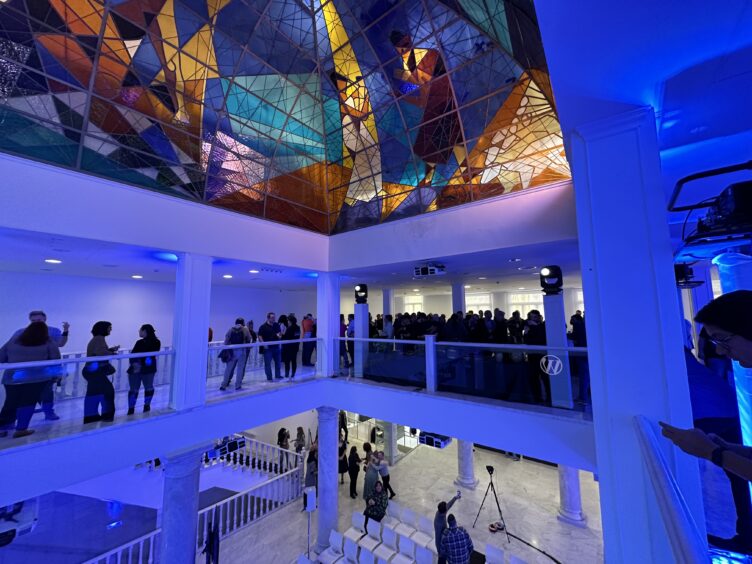Matt Mullenweg (and team) presented the yearly State of the Word from Madrid, Spain, this year, 2023. For the first time, this presentation was held outside of the United States, which, in my opinion, was a great step. The fact that the team chose Spain, which hosted no less than 9 WordCamps this year, was no coincidence. The Spanish WordPress community is amazing, and their chosen venue was amazing, too.

If you don’t know what the State of the Word is, it’s the yearly presentation in which Matt Mullenweg, WordPress co-founder and project lead, talks about the previous year’s wins and the plans for the upcoming year. And there was a lot to cover. I’ve personally been involved in WordPress core development for the last 16-17 years, and I honestly don’t think WordPress has ever had releases quite as ambitious as the ones the project is doing now. Coming back from today’s presentation, I was both impressed and excited for the future.
I was lucky enough to be able to attend in person. I got to hear all the plans and catch up with a lot of friends from the Spanish and wider community. Let me give you my highlights:
20 years of WordPress
WordPress turned twenty this year, quite the age for a software product, but it’s definitely not showing signs of wear and tear. Matt showed off some new sections of the WordPress.org site, specifically the showcase, the new events section, and the new WordPress remembers page, which shows that profiles can now be set to a “remembering” mode. I think that’s done very nicely and with much respect towards those who contributed a lot and are no longer with us.
Matt then continued to talk about Openverse briefly, then moved on to what I consider one of the most exciting developments of this last year: the WordPress playground.
The WordPress playground
The WordPress playground is a WordPress site that loads in your browser. It doesn’t require a server; it just works in your browser, and it’s surprisingly fast, too. It came back a few times later in the presentation and the Q&A, and I can honestly say you have to play with this. It’s an exciting new way of using WordPress, but it, and its blueprint functionality, also has potential far beyond what we’re doing with it now. The playground functionality will soon be used to power plugin demos on the WordPress plugin repository, which I think is a great improvement for people wanting to figure out whether a plugin suits their needs.
Later in the presentation, Matt showed a small AI that’s able to spin up a playground based on just a bit of textual input. It’s a super cool use case, and I think he’s completely right that simple conversational interfaces like that, when brought to more parts of WordPress, will help us gain more market share.
The 2024 theme
One of the best reasons to start playing with the playground is to play with the 2024 theme. It’s the first theme to really highlight all the powers that Gutenberg and Full Site Editing now have. Matt quoted Jamie Marsland, who said it’s the best default theme we’ve ever seen, and I think if you haven’t checked it out, you should just check out Jamie’s video of the 2024 theme. I’m inclined to agree with him. Matt went on to show many designs made with this beautiful theme.
Gutenberg updates
After that, Matt gave the stage to Matias Ventura, who talked about a ton of Gutenberg updates. I’m super excited about a couple of these, specifically two of them: smarter block patterns, where you can edit the text per instance but reuse the design everywhere, and custom fields connected to blocks. This really is best seen by just looking at the video, though, so if you’re interested in this stuff, go ahead and check it out. Lastly, Matias demoed a new admin design for all the list views (edit pages, etc.), which I think looks like a huge step forward.
Matias also gave a good mention of all the work being done on Performance, which is easy to ignore but so important for all of us who work in the editor and for all those people visiting our sites.
Data liberation
After all of Matias’s great updates about Gutenberg, Matt came back on stage to talk about the new data liberation project. I have to say that this was probably one of the highlights for me; Matt talked about how hard it is to move from other systems to WordPress, or even from one WordPress site to another. Zero friction for moving your website and its data from one platform to another is what we should all be striving for. Sidenote: I secretly hope that we can also use the EU’s data portability laws to force some of WordPress’ competitors to offer export options.
The whole State of the Word 2023 was full of excitement that I had been missing a bit for the last few years. COVID was hard for everyone, but it looks like the WordPress project has recovered now and is going full speed ahead. I can’t wait to see what it’ll bring us in 2024!
